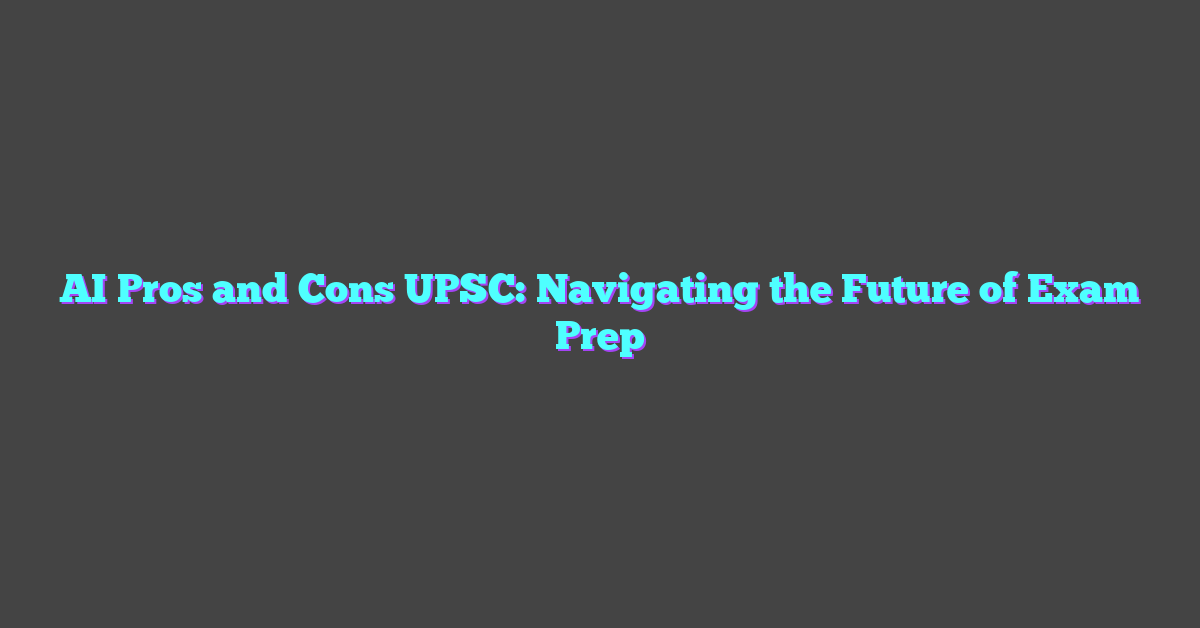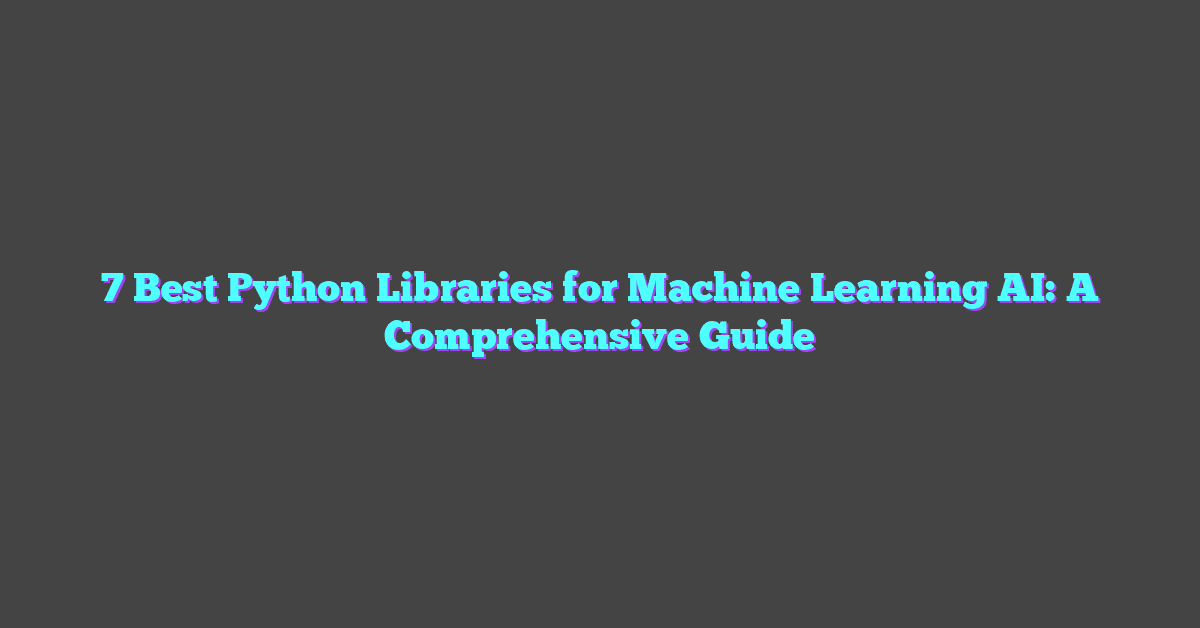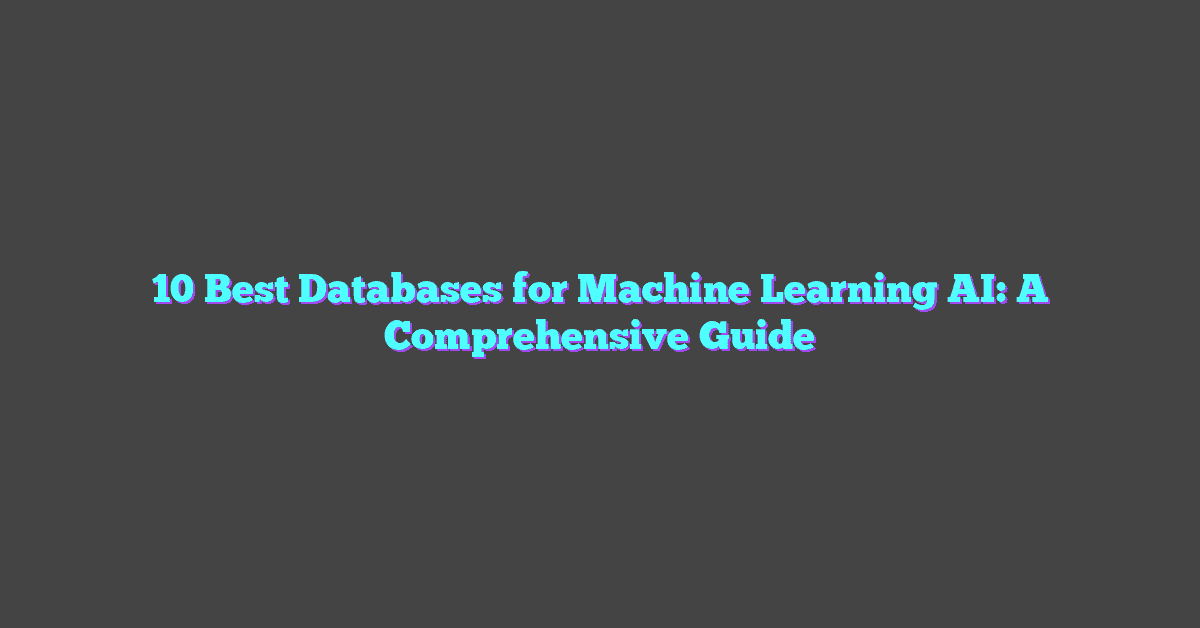Artificial Intelligence (AI) is revolutionizing every aspect of life, including the rigorous domain of civil services. As UPSC aspirants grapple with the enormity of their syllabus, AI’s role is both a boon and a bane. They’re curious: can AI really be a game-changer in their preparation?
From personalized study plans to smart analytics, AI has the potential to transform how candidates prepare. But it’s not all rosy; there are pitfalls and ethical dilemmas to consider. In this article, they’ll dive into the pros and cons of AI in the context of UPSC preparation, shedding light on how it’s reshaping the future of learning.
Pros of AI in UPSC Preparation
The integration of Artificial Intelligence (AI) into UPSC preparation provides a host of advantages that revolutionize the way candidates study. With AI, personalized learning has become a reality. Aspirants no longer have to follow a one-size-fits-all approach. Instead, AI algorithms analyze individual performance and create custom study schedules, focusing on areas that need improvement. This targeted method of preparation ensures that time is spent efficiently, and students’ preparation is robust where it matters most.

Another significant advantage is the access to real-time feedback. AI systems can promptly provide analysis on practice tests, offering insights into not just what questions were missed, but why they were missed. This immediate response allows aspirants to learn from their mistakes on the spot and adapt their strategies accordingly. Furthermore, this immediate correction mechanism helps in retaining concepts more effectively, as the feedback loop is much faster than traditional methods.
AI also contributes vastly to the depth and accessibility of learning resources. AI-driven platforms have the capability to process and categorize vast amounts of data, making it possible for students to access up-to-date information and research materials that are relevant to their syllabus. This ensures that learners are not overwhelmed but instead are provided with the most pertinent information.
The impact of AI on UPSC preparation extends to the development of smart analytics. These analytics help predict question trends and the likelihood of various topics appearing on the exams. They enable candidates to prioritize their study focus according to predictive models based not only on past papers but also on the evolving nature of the UPSC examination.
Efficiency in revision can also be traced back to the utilization of AI. By identifying patterns in a student’s learning process, AI applications can suggest repetitive drills on weak areas, spaced repetition for better memorization, and varied forms of content delivery such as visual aids or interactive sessions for complex concepts.
In harnessing the capabilities of AI, UPSC aspirants are equipped with tools that foster a more effective, engaging, and tailored preparation journey. With the industry evolving continuously, this intersection of technology and civil service preparation is poised to spawn even more innovative solutions to support the challenging journey of a UPSC aspirant.
Personalized Study Plans
Personalized study plans are revolutionizing UPSC preparation by addressing the unique learning styles and pace of individual aspirants. They’re excited to see AI algorithms analyze each student’s performance, strengths, and weaknesses to craft a tailored study schedule. This approach allows learners to focus on areas requiring extra attention, enhancing their overall preparation strategy.
The adaptive learning technology utilized in AI-driven study plans can identify when a student masters a topic. This prompts the plan to adjust itself, ensuring aspirants spend their time efficiently. These smart study schedules can cover a wide range of subjects, from current affairs to complex quantitative aptitude, adapting to the aspirant’s evolving needs.
Students can benefit from real-time updates to their study plans based on their progress and changing UPSC exam trends. They don’t have to waste time reevaluating and reorganizing their study routine; the AI does it for them. This presents a dynamic learning journey where the path to success constantly evolves to match their learning curve.
Additionally, AI-generated study plans can incorporate varied learning materials like videos, articles, and quizzes, creating an engaging and interactive study experience. This ensures that students not only learn the information but also develop critical thinking skills, which are crucial for tackling the UPSC examinations.
With these sophisticated systems in place, UPSC aspirants can say goodbye to generic study schedules. They can now embrace a future where their preparation is as unique as their aspirations, empowering them to approach one of India’s toughest tests with confidence and precision. As data about their learning behaviors continues to be collected, the effectiveness of these personal study plans is only poised to improve.
Smart Analytics for Performance Tracking
The infusion of AI in UPSC preparation brings to the table smart analytics, a pivotal feature that revolutionizes performance tracking. Rather than relying on traditional assessment methods, AI integrates advanced algorithms that analyze a UPSC aspirant’s performance with granular precision. From the number of correct answers to the time taken per question, AI digs deep into every aspect of test-taking.
This sophisticated analysis extends beyond mere quantification of right and wrong answers. AI platforms can identify patterns in a student’s preparation, pinpointing specific areas in need of improvement. For example, if a student consistently struggles with environment-related questions, the AI system not only highlights the weakness but also recommends tailored content to bridge the knowledge gap.
- Real-time Feedback: Immediate performance insights allow students to make adjustments quickly and efficiently.
- Predictive Analytics: Data patterns are used to forecast potential exam questions, focusing a student’s preparation on the most relevant topics.
- Progress Over Time: Students can track how their grasp of various subjects improves, offering a clear picture of where they stand in their prep journey.
UPSC aspirants particularly benefit from the intuitive dashboards provided by AI-enabled platforms. These dashboards present complex data in an accessible format, making it easier for students to digest their progress and stay motivated. Moreover, the use of AI eliminates any conscious or unconscious bias that might creep into self-assessment, providing a neutral, objective view of a student’s abilities and improvement over time.
The power of smart analytics is not just in presenting information but also in the actionable insights it offers. Students can leverage this detailed feedback to optimize their study plan continuously, refine their approach to weak subjects, and improve their time management skills. As the data grows, the AI systems learn and adapt, offering more accurate guidance tailored to the unique ups and downs of an aspirant’s learning curve.
Enhanced Study Material Recommendation
Personalizing study materials for UPSC candidates is another significant advantage that AI brings to the table. The sheer volume of syllabus that UPSC encompasses can be daunting. It requires the aspirant to not only understand but also retain a vast array of information from diverse subjects. By integrating AI into the process, students receive tailored recommendations for study materials that best fit their learning style and knowledge gaps.
AI-driven platforms leverage sophisticated algorithms to sift through an ocean of resources, selecting the most relevant articles, books, and videos for each candidate. This not only saves time but ensures that the learners are studying the most appropriate materials. They no longer need to second-guess their choices, allowing them to focus solely on their preparation.
Key benefits of AI-curated study materials include:
- Efficiency: AI significantly reduces the time spent searching for resources.
- Relevancy: Content is matched to the student’s current level and exam requirements.
- Engagement: Interactive and diverse formats keep the study process interesting.
The data gathered by AI also helps in uncovering hidden patterns in a student’s interaction with the study material. If a student is spending too much time on a particular topic, it could indicate a difficulty, prompting the system to recommend alternative resources or different explanations.
Smart analytics further refine the recommendation processes by evaluating which materials yield the best results in terms of student performance. This continuous loop of feedback and adjustment makes the learning experience incredibly dynamic and responsive to the needs of the individual.
It’s not just about selecting the right material, but also about presenting it in a way that’s most beneficial. Some students may learn better through visuals, such as infographics or video lectures, while others may prefer in-depth reading materials or interactive simulations. AI is adept at recognizing these preferences and customizing the study materials accordingly.
As study habits evolve and more data becomes available, AI and machine learning continue to refine the recommendation process, always keeping the students’ preparation a step ahead. The technology’s ability to adapt and update its recommendations means that learners are always at the cutting edge, prepared with the latest and most effective study materials.
Time-Saving and Efficient Study Techniques
One of the standout applications of AI in UPSC preparation is its role in streamlining the study process. Rather than sifting through mountains of information, AI systems curate content, enabling candidates to focus on studying rather than on planning what to study. This approach is particularly beneficial for UPSC aspirants who are often pressed for time and must cover a vast syllabus.
Personalized AI tutors elevate efficiency by addressing a candidate’s specific learning needs. They pinpoint areas where a student may be struggling and adapt the study material accordingly. For instance, if a student consistently underperforms in Indian Polity, the AI will allocate more resources and practice questions in that area until the student’s performance improves.
These AI-driven platforms often integrate time-tracking tools that assist in adhering to strict study schedules. They remind students about upcoming sessions and keep track of time spent on each topic, ensuring that all subjects are covered adequately. The goal is to use technology to create an optimal study regime that maximizes learning while minimizing unnecessary time expenditure.
Through the power of analytics, AI platforms flag content that tends to consume excessive time. They guide students toward more effective study methods, such as interactive quizzes or flashcards, as opposed to passive reading, which may not be as effective. Moreover, features like speech-to-text and automated note-taking assist in the rapid reviewing of study material, making the process not just faster but more thorough.
Further, machine learning algorithms refine study recommendations over time. As a student interacts with the platform, the system learns which types of content yield the best results for that individual. Whether it’s video tutorials, detailed infographics, or practice tests that mimic the UPSC format, the AI ensures the student’s prep kit evolves with their learning curve.
The infusion of AI into study techniques thus not only saves time but also propels students towards a more proficient and streamlined approach to UPSC preparation. Every minute saved is a minute earned for revision, deepening understanding, or well-deserved rest, which is indispensable for achieving success in one of the toughest competitive exams.
Cons of AI in UPSC Preparation
While AI has significantly enhanced the landscape of UPSC preparation, there are challenges and limitations. Over-reliance on AI-driven systems could potentially curb the aspirants’ ability to think and work independently. Students might become too dependent on the personalized assistance, causing them to struggle in scenarios where intuitive and spontaneous thinking is required. After all, the UPSC exams value an individual’s ability to effortlessly navigate through unpredictable problems.
Another significant concern is privacy and data security. AI platforms require personal data to craft personalized study plans and insights. The accumulation of such sensitive information could lead to vulnerabilities where a student’s personal and performance data might be at risk of unauthorized access or breaches.
The effectiveness of AI is also contingent on the quality and volume of data available. In some instances, there may be inadequate data to fully understand a student’s learning pattern or there might be biases in the information itself. AI systems are only as good as the data fed into them, and if the data is skewed or limited, the conclusions and recommendations may not be accurate or beneficial to the student.
Technical glitches and errors in AI algorithms can occasionally lead to setbacks in learning. If an AI tutor malfunctions or provides incorrect information, it may not only cause confusion but also lead to gaps in knowledge that can be detrimental during high-stakes exams like the UPSC.
AI, although revolutionary, cannot entirely replicate the nuanced understanding and mentorship provided by human tutors. Emphasizing soft skills such as communication, emotional intelligence, and ethical decision-making are areas where AI cannot offer much help. These skills are integral to civil services and require a human touch for development.
For financial expenditure, investing in AI for UPSC preparation might be cost-prohibitive for some candidates. Quality AI-powered educational platforms often come with a subscription fee, which could exclude financially disadvantaged students from accessing these advanced learning tools.
Finally, there’s the matter of technology access. Not all students may have the necessary gadgets or stable internet connections required to take full advantage of AI-driven educational resources. This digital divide could lead to an unequal playing field where only the tech-equipped aspirants could benefit from AI’s advantages.
Ethical Dilemmas in AI Usage
When examining the role of AI in UPSC preparation, it’s critical to address the ethical dilemmas such integration poses. AI’s capabilities, while impressive, come with a significant responsibility to use them wisely. Ethical considerations include the potential for AI to unintentionally reinforce societal biases. These intelligent systems are trained on large datasets that may contain historical biases which, if not properly accounted for, could skew the AI’s decision-making process.
This is particularly pertinent when considering the diverse demographic that UPSC candidates represent. An AI system could, for instance, favor study materials that resonate with one group over another, based on patterns in the training data. Such outcomes might be invisible at first glance but could lead to unequal preparation opportunities among aspirants.
Another ethical concern is transparency. Candidates relying on AI for guidance deserve to understand how their study plans and recommendations are being formulated. Yet, the complex algorithms underlying AI systems can be incredibly opaque, known as “black boxes”, which make it difficult to scrutinize their operations. This lack of transparency raises questions about accountability should the AI provide misguided advice or fail to prepare a student for key UPSC topics.
Privacy considerations must also be at the forefront. As AI systems require access to personal data to offer customized learning experiences, it’s paramount that candidates’ information is safeguarded. Data security protocols are thus essential, though they must be robust to resist the ever-evolving landscape of cyber threats. Without strict data protection measures, aspirants’ personal information could be misused or exposed.
Lastly, the delegation of ethical decisions to AI systems is a contentious issue. While AI can efficiently handle data analysis and routine tasks, it cannot easily navigate the complex moral landscape that human educators or mentors can. The decision of whether to allow AI to make judgements that significantly impact a student’s educational trajectory is a heavy one, demanding careful consideration by all stakeholders involved.
Dependence on AI for Learning
In the rapidly evolving sector of education, particularly for rigorous exams like the UPSC, the integration of AI offers remarkable adaptability in learning. Students nowadays can have curriculums tailor-made to their learning speeds and styles, thanks to AI’s capacity to analyze and understand individual progress. However, there’s growing concern over learners becoming too dependent on AI tools.
As AI continuously feeds candidates with customized information and problem-solving methods, they risk losing their ability to function without technological crutches. Moreover, the autonomy in learning could diminish, with AI dictating the what, when, and how of study routines. There are questions about whether students will retain the growth mindset and critical thinking skills necessary for the unpredictability and the varied nature of UPSC questions.
Another issue is the potential for AI to foster a passive attitude towards learning. Candidates might find themselves in a cycle where they’re solely consuming information presented by AI without actively seeking knowledge or questioning the content. This passive consumption is not ideal for the comprehensive understanding needed for UPSC exams where analytical skills and a proactive approach are invaluable.
Here are some of the specific drawbacks of over-reliance on AI in UPSC prep:
- Reduced competence in independent research and information synthesis.
- A possible decline in motivation to seek alternative learning resources outside AI recommendations.
- Erosion of self-reliance skills important for high-pressure exam scenarios.
Amidst these concerns, it’s vital that users of AI in UPSC prep strikes a balance between leveraging technology and nurturing their ability to learn independently. While AI can pave the way for efficient study sessions, it’s equally important for aspirants to engage in self-driven learning activities that augment the core strengths AI brings to the table.
Limited Human Interaction in the Learning Process
The advent of AI in UPSC preparation has revolutionized the way aspirants study, yet it brings a significant shift in human interaction. Gone are the days when the learning process was predominantly a human-to-human interaction. As AI integration moves to the forefront, traditional classroom dynamics change, making personal mentorship less prevalent.
AI-driven tools provide an incredible array of resources, such as personalized study materials and performance analytics. These resources enable students to study more efficiently, but they also reduce the necessity for student-teacher engagements. The lack of direct interaction with educators can have a palpable impact on the learning experience. Feedback from a mentor, nuances in their explanations, and their personal experiences can be as impactful as the facts they teach, and this qualitative aspect is often missing in AI-facilitated learning.
Furthermore, the subtleties of soft skills development, such as communication, leadership, and ethical judgement, are typically nurtured through human interaction. AI, for all its advances, hasn’t yet mastered the art of imparting these soft skills which are crucial for civil services. Without human engagement, students might find themselves adept in knowledge yet less prepared in these essential areas.
Students also risk becoming too insulated within an AI-driven study bubble. They might miss out on group study benefits and the diverse viewpoints that come from studying with peers. Collaboration and discussion are not only key to deepening understanding but also to building relationships that can support them through the arduous preparation process.
The reliance on AI tools can inadvertently lead to a lesser degree of emotional intelligence. An AI cannot offer the same level of empathy or motivation that a human mentor can. During preparation, candidates often need encouragement and inspiration, which are best delivered through the subtle emotional cues and reassurances from a teacher or peer.
While AI offers unprecedented customization and convenience in learning, the importance of human connection and its role in the holistic development of an aspirant cannot be overstated. Balancing technological advancements with human touchpoints will be critical for developing well-rounded individuals ready to face the demands of civil service.
Conclusion
Navigating the UPSC preparation journey with AI provides a blend of cutting-edge technology and traditional learning. While AI offers tailored resources and efficiency, it’s essential to strike a balance. As aspirants embrace these tools, they must stay mindful of the value in human guidance and the development of soft skills. It’s about using AI as a complement to, not a replacement for, the human elements that foster a well-rounded education. Ultimately, the goal is to leverage AI’s strengths while maintaining the irreplaceable human touch that nurtures not just a competent civil servant but a well-informed and empathetic individual ready to serve society.
Frequently Asked Questions
What are the benefits of using AI in UPSC preparation?
Artificial Intelligence (AI) can revolutionize UPSC prep by providing personalized study plans, adaptive learning tailored to student performance, smart analytics for performance tracking, and recommendations for study materials. This personalized approach can make studying more efficient and effective.
What are the limitations of AI in UPSC preparation?
Limitations include potential over-reliance on AI leading to reduced independent research skills, data privacy concerns, technical errors, the inability of AI to replicate human mentorship, cost issues, and the digital divide affecting technology access.
Can AI replace human mentors in UPSC preparation?
AI cannot fully replace human mentors in UPSC preparation as it lacks the ability to develop soft skills and emotional intelligence. Mentorship often encompasses more than knowledge delivery – it includes motivation, empathy, and personalized guidance that AI currently cannot replicate.
How does over-reliance on AI affect UPSC aspirants?
Over-reliance on AI can lead to a decline in self-reliance, motivation, and independent research skills. It may limit human interaction, reduce emotional intelligence, and confine students within a study bubble that lacks the rich input from educators and real-world perspectives.
Are there ethical concerns associated with using AI in UPSC preparation?
Yes, there are several ethical concerns, such as algorithmic biases, lack of transparency in AI decision-making processes, privacy breaches, and the delegation of ethical decisions to AI systems, all of which require careful consideration and management.
Is it cost-prohibitive to integrate AI into UPSC studies?
It can be cost-prohibitive for some candidates to access AI tools for UPSC preparation, as the technology might not be affordable for all. This discrepancy can lead to an unfair advantage for those who can afford AI resources, thus amplifying the digital divide.
How can UPSC aspirants balance AI with traditional learning methods?
UPSC aspirants should use AI as a complement to traditional learning methods. Maintaining human contacts, seeking diverse learning resources, and developing soft skills are equally important for holistic development. A balanced approach ensures technological benefits without sacrificing the human elements of learning.




